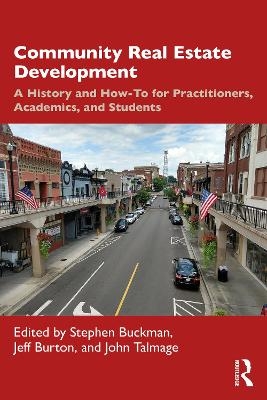
Community Real Estate Development
Routledge (Verlag)
978-0-367-62554-2 (ISBN)
Community Real Estate Development: A History and How-To for Practitioners, Academics, and Students introduces the fundamentals of affordable housing to aspiring development professionals. From understanding the history informing today’s affordable housing programs to securing financing and partnering with public and private stakeholders, this primer equips students and emerging professionals for success in a unique area of the real estate industry. Topical chapters written by nationally recognized leaders in community real estate development (CRED) take a didactic approach, using real-life examples and case studies to provide context for reflection. Drawing on the authors’ experience as private sector developers, state and municipal housing officials, and not-for-profit executives, this versatile resource offers an insider’s perspective on creating and maintaining affordable housing in any real estate market.
Features:
Covers topics including community design, development policy, tax credits, land use planning, development rights, historic buildings, adaptive reuse, tax increment financing, and gentrification
Presents interviews with development professionals in asset and property management, commercial real estate brokerage, and local housing authorities and government agencies
Highlights winning case studies from a student competition to inspire similar classroom activities
Includes a glossary of CRED-specific terminology to help readers master the language of affordable housing
Contains diverse examples, planning tools, and "programs to make numbers work," with a companion website available
Blending the latest academic research with hard-won insights from the field, Community Real Estate Development prepares the next generation of affordable housing professionals to continue the work of its pioneering authors and editors.
Stephen Buckman is an Associate Professor of Real Estate Development at Clemson University. His research is centered on resiliency, waterfront development, and community real estate development. Dr. Buckman co-taught the CRED program for three classes and was a member of the CRED Steering Committee. Dr. Buckman is also a partner in a real estate development company that specializes in small community-oriented multi-family projects as well as consulting to developers and communities. Jeff Burton manages the City of Tampa, Florida Community Redevelopment Agency. He also earned his Ph.D. from the University of South Florida, writing a dissertation on sustainable redevelopment. Jeff is an experienced State of Florida licensed residential building contractor and has performed over 5,000 building safety inspections as a licensed building code administrator. While at the Insurance Institute for Building and Home Safety (IBHS), he co-authored the Louisiana State building code law in the aftermath of Hurricane Katrina and was a founding research member of the State of Florida post Hurricane Charley building code analysis team. Jeff is also the President of the Florida Redevelopment Association (FRA). John Talmage is Director of the Lee County Office of Economic Development. He is responsible for attracting $5 billion of new development to Lee County ranging from affordable housing to corporation headquarter attraction to new community revitalization initiatives.
1. Introduction to Community Real Estate Development. 2. Community Development Policy and Community Real Estate Development. 3. Programs to Make the Numbers Work and Their Impacts: Low-income Housing Tax Credits, New Market Tax Credits, and Opportunity Zones. 4. Transfer of Development Rights and Community Development. 5. Historic Building Reuse as a Form of Community Real Estate Development. 6. Community Design and the Real Estate Development Process. 7. Community Redevelopment, Tax Increment Financing and CRED. 8. Balancing the Gentrification Elephant in the Room, or Slaying a Monster? Notes Towards a Post-American Urban Future. 9. How CRED Financing Differs from Market Rate. 10. Real Estate and CRED: A broker's perspective. 11. The Role of the Housing Authority. 12. Mosaic Development in Action. 13. Using Incentives for Affordable Housing. 14. Conclusion What is the future for CRED and how you can utilize CRED oriented ideas to achieve community focused developments. Introduction to Examples of Class Winnders. 2018 Winner. 2019 Winner. Appendix.
| Erscheinungsdatum | 17.08.2022 |
|---|---|
| Zusatzinfo | 5 Tables, black and white; 1 Line drawings, black and white; 22 Halftones, black and white; 23 Illustrations, black and white |
| Verlagsort | London |
| Sprache | englisch |
| Maße | 156 x 234 mm |
| Gewicht | 320 g |
| Themenwelt | Naturwissenschaften ► Biologie ► Ökologie / Naturschutz |
| Sozialwissenschaften ► Soziologie ► Spezielle Soziologien | |
| Wirtschaft ► Betriebswirtschaft / Management ► Rechnungswesen / Bilanzen | |
| Betriebswirtschaft / Management ► Spezielle Betriebswirtschaftslehre ► Immobilienwirtschaft | |
| ISBN-10 | 0-367-62554-7 / 0367625547 |
| ISBN-13 | 978-0-367-62554-2 / 9780367625542 |
| Zustand | Neuware |
| Haben Sie eine Frage zum Produkt? |
aus dem Bereich


